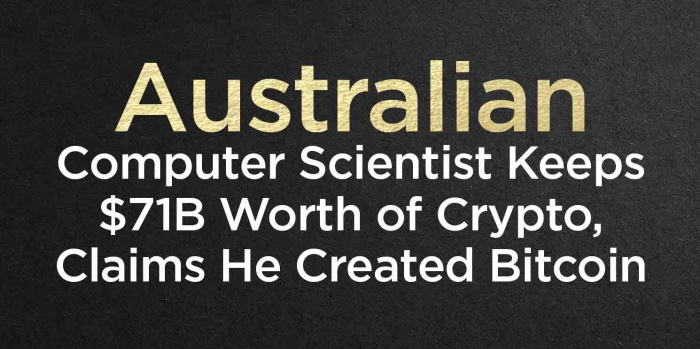
Australian Computer Scientist Keeps $71B Worth of Crypto, Claims He Created Bitcoin
In a US civil trial announced Monday, an Australian computer scientist known as Dr. Craig Wright won against the family of a deceased business partner who claimed that they owe him worth tens of billions in Bitcoins .
A jury in Florida determined that Dr Wright does not owe half of 1.1 million Bitcoin to David Kleiman’s family . However, the jury awarded US$100 million ($142 million) in intellectual property rights to a joint venture between the two individuals, which was significantly less than what Mr Kleiman's lawyers were requesting at trial.
The trial focused on 1.1 million Bitcoin, which was valued at around $50 billion (AUD $71.03 billion) based on prices last December 6, 2021.
These are among the first Bitcoins to be created through mining and halving , and they could only be possessed by someone involved with BTC from its inception — such as its creator, only known by everyone as Satoshi Nakamoto. Now the crypto community will be looking for proof that Dr Wright keeps his promise to demonstrate that he is Satoshi Nakamoto.
The case that came to trial in federal court in Miami was highly technical, with the jury being exposed to explanations of the complex workings of cryptocurrencies as well as the murky origins of Bitcoin. The jurors took a full week to deliberate, frequently asking lawyers on both sides and the judge questions about how cryptocurrencies work as well as the commercial ties between the two men.
Because of this, the origins of Bitcoin currency have always been a bit of a mystery, which is why this legal battle has attracted so much attention from the public. In October 2008, as the global economic crisis was reaching its peak, someone named "Satoshi Nakamoto" published a paper laying out the groundwork for a digital currency that would not be dependent
The name Satoshi Nakamoto , which roughly translates as "at the centre of" in Japanese, was never assumed to be the real identity of Bitcoin's creator. Some in the cryptocurrency industry do not believe that Satoshi Nakamoto was a single individual. All Bitcoin transactions are public, and there are currently about 1.1 million Bitcoins worth $19 billion.
Members of the Bitcoin community have repeatedly demanded that Dr Wright move a fraction of his coins to demonstrate ownership and establish his legitimacy. Both Dr Wright and other cryptocurrency experts took the stand during the trial and stated that they owned the Bitcoins in question. If he were to win, Dr Wright said he would show his ownership.

In April 2013, David Kleiman died at the age of 46. His family has claimed that David Kleiman and Dr Wright were close friends and collaborated to develop Bitcoin - which then led to the creation of competing altcoins including Ethereum and Litecoin . The estate of Mr Kleiman was suing for a percentage of the Bitcoins in question as well as intellectual property rights.
The lawyers for W&k Information Defence Research LLC, a joint venture between the two men, celebrated when the jury returned a $100 million verdict in favour of the firm, which developed software that laid the foundation for early blockchain and cryptocurrency technologies.
Dr Wright's attorneys have stated several times that David Kleiman and Dr Wright were friends and collaborated on projects, but their collaboration had nothing to do with Bitcoin's invention or early operation. If Dr Wright is successful in court, he has said he will give much of his Bitcoin fortune to charity.
What is Bitcoin?
Bitcoin is a decentralised digital currency that aims to create a new form of economy - one that is free from the prying eyes of the government. It uses a blockchain technology : a cluster of blocks made from cryptography. These blocks are under the management of a peer-to-peer network to be used as distributed ledger in which nodes follow a protocol to validate a new set of blocks. As a result, this forms a secure network with a high Byzantine fault tolerance.
For a very long time since 2008, Bitcoin became popular after a person (or group) named Satoshi Nakamoto used the technology to form a public transaction ledger. This cuts out the middleman and creates transparency between the buyer and seller. Ever since then, more people see Bitcoin as a form of a new era in money - one that may just bring down the US dollar bill. It made massive mainstream success in 2017 after the cryptocurrency hit an all-time high of $20,000 in December of that year. Since then, many people became aware of this new form of money that made Wall Street panic along with stockholders that saw people with nothing suddenly become millionaires.
The creation of Bitcoin also led to the establishment of altcoins: other cryptocurrencies that are not Bitcoin - each with their own technologies that either improve the state of the blockchain or for entertainment purposes.
New Opportunities and New Risks
Since cryptocurrency is still in its infancy, it overtakes the stock market as the most volatile form of investment and trading. Due to its early stages, this also gave rise to scam coins that made people lose thousands of dollars, such as the infamous OneCoin and the meme-heavy BitConnect . This also led to some shady business deals in the blockchain including drug deals and money laundering. Since the transactions are decentralised, government agencies - especially the SEC - keep panicking as to how to combat these illegal activities.
Some corporations and governments do not approve of its value, while others show interest in it such as Australia’s top bank, Commonwealth Bank of Australia (CBA) . This results in a mix of tracked transactions while maintaining a decentralised form of business - that is why the likes of CBA have deployed their own forms of cybersecurity to make sure their clients are receiving and transferring money with clean hands.
Yet, behind all the hype carries heavy risk. Since the crypto market remains volatile, you may see prices skyrocket to 90% in one day or even plummet miserably down to -80%. That is why investors and people who show interest in cryptocurrency must exercise extreme caution to minimise losses and secure profits.





Leave a Reply
82 comments
Add comment ×